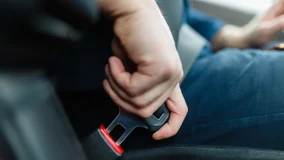Seat Belt Safety Laws
Throughout the country there are state regulated laws when it comes to wearing your seat belt while either driving or being a passenger in a vehicle. Seat belt laws started to come into effect in the 1990’s with California being the first state to make it a primary offense for not wearing a seat belt. 30 more states later added their own seat belt laws.
There are two different types of seat belt laws across the country – primary enforcement and secondary enforcement. New Hampshire is currently the only state that does not require adults to wear a seat belt while driving a vehicle.
Primary Enforcement
As stated before, each state has its own laws; 34 states have adopted the practice of primary enforcement seat belt laws. Primary enforcement laws mean that a police office can pull a driver over for not wearing a seat belt, no other explanation needed.
In some states, there is an age limit on primary enforcement. If a driver is under 18, s/he can be pulled over for not wearing a seat belt but an older driver would not be pulled over for not wearing one.
Fines for a first offense range from $10-$90, depending on the state.
Secondary Enforcement
Secondary enforcement laws mean that a police officer can only cite a driver for not wearing a seat belt if the driver was pulled over for another reason, such as speeding or running a red light.
When seat belt laws first started to come into effect, most states adopted this practice. California was the first state to make it a primary enforcement and other states followed suit.
With these laws, there has been a great increase in seat belt usage for drivers and passengers alike. In 2019, 90% of Americans reported wearing a seat belt.
Why wear it?
The consequences of not wearing a seat belt when being either a passenger or driver in a vehicle are clear and can even be deadly.
Buckling up is the most effective thing you can do to protect yourself in an accident; an airbag alone will not protect you. There have been many times when airbags have failed to even deploy during accidents. Seat belts are your best defense against distracted drivers, impaired drivers, and aggressive drivers on the road.
If you buckle up, whether you’re in a front seat or back, you reduce your risk of fatal or critical injury if you’re involved in a car accident. Wearing your seat belt will also keep you from getting fined or ticketed while driving.
At Acceptance, we want you to get to your destination safely. If you have any questions about seat belts, insurance, or how our Ticketproof option can benefit you, call your local agent today.



